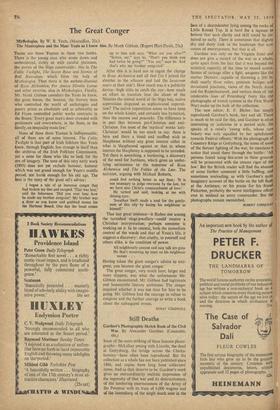The Great Conger
Mythologies. By W. B. Yeats. (Macmillan, 21s.)
The Masterpiece and the Man: Yeats as I knew him. By Monk Gibbon. (Rupert Hart-Davis, 21s.)
THERE are three Yeatses in these two books. There is the young man who wrote down and embroidered, richly or with careful plainness, the stories of the Sligo countryside : this in The Celtic Twilight, The Secret Rose and Stories of Red Hanrahan, which form the bulk of Mythologies. Then there is the aesthete-illumine of Rosa Alehemica, Per Arnica Silentia Luttae and other reveries, also in Mythologies. Finally, Mr. Monk Gibbon considers the Yeats he knew, the great bonze, the Senator, the literary boss who controlled the world of anthologies and poetry prizes as absolutely and as arbitrarily as Ed Flynn controlled public works contracts in the Bronx. 'Every great man's door crowded with petitioners and everywhere, in the State, in the family, an inequality made law.'
None of these three Yeatses is indispensable; all of them are of some interest. The Celtic Twilight is that part of Irish folklore that Yeats knew, through English; less strange in itself than the archives of the Irish Folklore Commission, yet a mine for those who like to look for the ore of Imagery. The tone of this very early work (1893) does not yet exclude humour, humour Which was not grand enough for Yeats's middle period, not harsh enough for his old age. The best is the story of the giant eel's advice: I began a tale of an immense conger that had broken my line and escaped. 'That was him,' said the fisherman. 'Did you ever hear how he made my brother emigrate? My brother was a diver as you know and grubbed stones for the Harbour Board. One day the beast comes
up to him and says, "What are you after?" "Stones, sur," says he. "Don't you think you had better be going?" "Yes, sur," says he. And that's why my brother emigrated.'
After this it is hard not to regret the change to Rosa Alchemica and all that ('as I joined the alembic to the athanor and laid the lavacrum marls at their side'). How much was it a publicity device—high stilts to catch the eye---,how much an effort to translate into the idiom of the Nineties the mental world of the Sligo boy, native superstition disguised as sophisticated supersti- tion? The native superstition seems to have been on the whole kinder, and certainly less hysterical, than the incense and -peacocks. The difference is in part that between pre-Christian and anti- Christian. For most of the 'mystical' works 'anti- Christian' would be too much to say; there is here and there a timid and muffled wish to blaspheme without any great interest either in what is blasphemed against or that in whose interest the blasphemy is supposed to be intended. Yet there is something, a hardening, a discovery of the need for hardness, which gives an under- lying seriousness to the nonsense of Rosa Alchemica and The Fables of the Law. The narrator, arguing with Michael Roberts, could find nothing better to say than: 'It is not necessary to judge everyone by the law, for we have, also Christ's commandment of love'
He turned and said, looking at me with shining eyes : 'Jonathan Swift made a soul for the gentle- men of this city by hating his neighbour as himself' That last great sentence—it flashes out among the tarnished stage-jewellery---could receive a Christian interpretation; perhaps someone is working on it. In its context, both the immediate context of the words and that of Yeats's life, it suggests a discovery : that cruelty, to yourself and others alike, is the condition of power. .
All neighbourly content and easy talk are gone He that's mounting up must on his neighbour mount . . .
Having taken the giant conger's advice to emi- grate, you become the giant conger.
The great conger, very much later, larger and more slippery, was what the unfortunate Mr. Gibbon encountered. Mr. Gibbon had legitimate and honourable literary ambitions. The conger inquired whether it was not time for him to be going. Mr. Gibbon had the courage to refuse to emigrate and the further courage to write a book about the subsequent events.
DONAT O'DONNELL






































 Previous page
Previous page